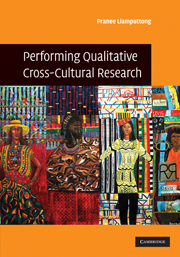Book contents
- Frontmatter
- Contents
- Preface
- About the author
- About the book
- 1 Performing qualitative cross-cultural research: an introduction
- 2 Moral and ethical perspectives
- 3 The research participants: accessing and reciprocity
- 4 Cultural sensitivity: a responsible researcher
- 5 Insider/Outsider perspectives and placing issues
- 6 Cross-cultural communication and language issues
- 7 Personal and collective testimony
- 8 Local knowledge, local power and collective action
- 9 Writing and disseminating in cross-cultural research
- In closing …
- References
- Index
- References
8 - Local knowledge, local power and collective action
Published online by Cambridge University Press: 05 June 2012
- Frontmatter
- Contents
- Preface
- About the author
- About the book
- 1 Performing qualitative cross-cultural research: an introduction
- 2 Moral and ethical perspectives
- 3 The research participants: accessing and reciprocity
- 4 Cultural sensitivity: a responsible researcher
- 5 Insider/Outsider perspectives and placing issues
- 6 Cross-cultural communication and language issues
- 7 Personal and collective testimony
- 8 Local knowledge, local power and collective action
- 9 Writing and disseminating in cross-cultural research
- In closing …
- References
- Index
- References
Summary
What understanding begins to do is to make knowledge available for use, and that's the urgency, that's the push, that's the drive.
(Lorde 1984: 109)CBPR [community based participatory research] also holds immense promise for insuring that research focuses on topics of deep concern to communities and is conducted in ways that can enhance validity, build community capacity, promote systems change, and work to reduce health disparities.
(Minkler & Wallerstein 2008a: 18)This chapter continues people's testimonies in cross-cultural research. In the previous chapter, I focused on personal and collective testimonies, but this chapter will emphasise personal and collective testimonies within a collaborative effort. That is, through the combination of personal and collective testimonies, people work together with others (the researchers) to resist colonisation and find ways to improve their lives and situations. Hence, this chapter will be dedicated to the methodology of community based participatory research (CBPR), which will include discussions on CBPR, participatory action research (PAR) and the photovoice method.
In the past few decades, Nina Wallerstein and Bonnie Duran (2008: 27) contend that we have seen an emergence of a new paradigm of participatory research. This has raised many challenges to the practice of positivist science. It has also asked crucial questions about the construction and use of knowledge and the importance of the power relations which permeate the research process.
- Type
- Chapter
- Information
- Performing Qualitative Cross-Cultural Research , pp. 186 - 211Publisher: Cambridge University PressPrint publication year: 2010



